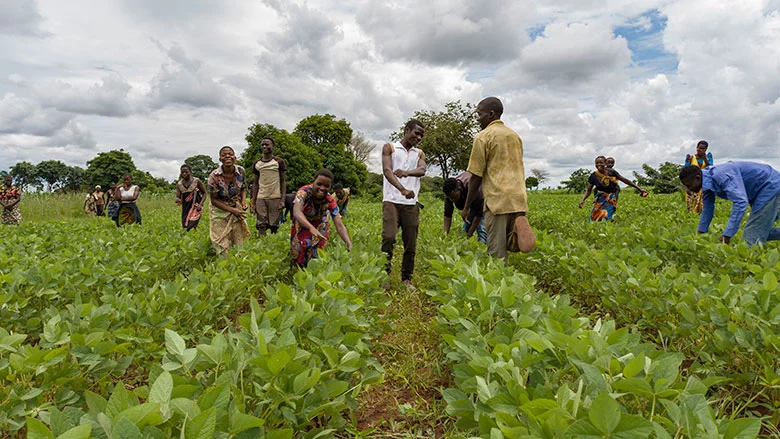The recent floods that devastated and washed away hundreds of thousands of hectares of farmlands across many states in the country have put many farmers who accessed loans from various agricultural intervention schemes for this year’s farming season under intense anxiety. Due to huge losses suffered from the 2022 floods, the farmers are worried about the fate of their agricultural loans altogether put at N1.4tn.
The 2022 floods, according to the National President of the All Farmers Association of Nigeria (AFAN), Kabiru Ibrahim, are the worst experienced in Nigeria since 2012. It destroyed crops; over 500,000 hectares of farmlands belonging to thousands of smallholder and commercial farmers across the country. While some of these farmers said they accessed loans from both the Anchor Borrower Programme (ABP) of the CBN, commercial banks, and micro finance banks; others got credit facilities from grain processors. Grain merchants and rice processing companies usually grant loans in cash and farm inputs including chemicals under an arrangement that farmers would, after harvest, pay back with paddy rice or maize.
US earmarks $50m to support 2023 polls
Naira redesign: Grains prices crash days after record surge
Figures at the beginning of this year’s wet season showed that the CBN had supported over 4.8 million farmers with over N1 trillion across the country along 23 commodities. Out of the approximately N1trillion granted under the ABP, CBN is said to have recovered only N400 billion with about N600bn yet to be repaid. A total disbursement of about N744.32bn was equally provided for 678 projects in agro-production and agro-processing under the CBN’s Commercial Agriculture Credit Scheme (CACS).
The need to provide insurance cover for farmers to manage agricultural risks and disasters led to the establishment of the Nigerian Agricultural Insurance Scheme on November 15, 1987. The implementation of the scheme was initially vested in the Nigerian Agricultural Insurance Company Limited, which was later incorporated in June, 1988 but later turned into a corporation in 1993 by the enabling Act 37 of 1993. NAIC is “a wholly-owned federal government insurance company set up specifically to provide agricultural risks insurance cover to Nigerian farmers”. NAIC currently subsidises farmers’ insurance in the agricultural value chain by 50 per cent.
All loans granted to farmers by the CBN through ACGSF are insured from source by the Nigerian Agricultural Insurance Corporation (NAIC). Also, loans received from the Bank of Agriculture have insurance costs built into credit facilities. But due to some farmers’ apathy for religious reasons, loans received in the informal sector from grain merchants or community groups are utilised without insurance cover. Some farmers, too, who secure loans from commercial banks under different investment schemes but utilise such for farming care less about insuring such credit facilities even though all loans deployed to farming are required to be insured regardless of the purposes for which they were granted or the financial institutions from which they were acquired. Some of them do this due to lack of adequate information about insurance.
While reacting to the losses incurred by farmers from the 2022 floods, the Managing Director of NAIC, Mrs Folashade Joseph, affirmed that insured farmers shall be paid adequate compensations; noting however that NAIC can only sympathise with farmers who suffered from losses arising from the floods but did not have corporation’s cover. She, therefore, urged such farmers to take advantage of the agricultural insurance solutions of the NAIC.
While we encourage NAIC to quickly compensate farmers whose insured agricultural investments are part of the over N1 trillion agricultural loans owed, the assertion by the Director of Development Finance, CBN, Dr Yusuf Yila, that “any person who borrowed from us must pay back” raises questions about the insurance premium paid by those farmers on their respective loans. If the whole point of insuring a loan is to avoid paying it in the event of a disaster covered by the insurance, the claim by Dr Yila that “every single loan taken from our development finance will be returned” needs to be interrogated further. Even for farmers whose loans were insured, many of them know little about the terms and conditions of the insurance covering their loans. The insurance sub-sector of the economy still requires some repositioning.
Authorities at NAIC do not actually seem to be doing enough in terms of sensitising farmers on the need to insure their investments in agriculture. Many farmers know little about what it means to insure their agric loans, which also suggests why farmers have continued to remain indifferent to insurance either for religious reasons even as no religion prohibits insurance or for sourcing their loans from outside of the banking system where the lender is not under any obligation to enforce any insurance policies. Meanwhile, interventions from the Ecological Funds could be provided for this group of vulnerable framers by government.
To secure the future for all farmers and eliminate the need for unpredictable ad-hoc assistance when insurable losses occur, Daily Trust calls on NAIC to collaborate with the National Orientation Agency to sufficiently sensitise farmers in rural communities to secure insurance policy for all their credit facilities, farmlands and implements. Farmers must be made to appreciate that the cost of snubbing agricultural insurance is worse than the devastations they suffer from floods.

 Join Daily Trust WhatsApp Community For Quick Access To News and Happenings Around You.
Join Daily Trust WhatsApp Community For Quick Access To News and Happenings Around You.
